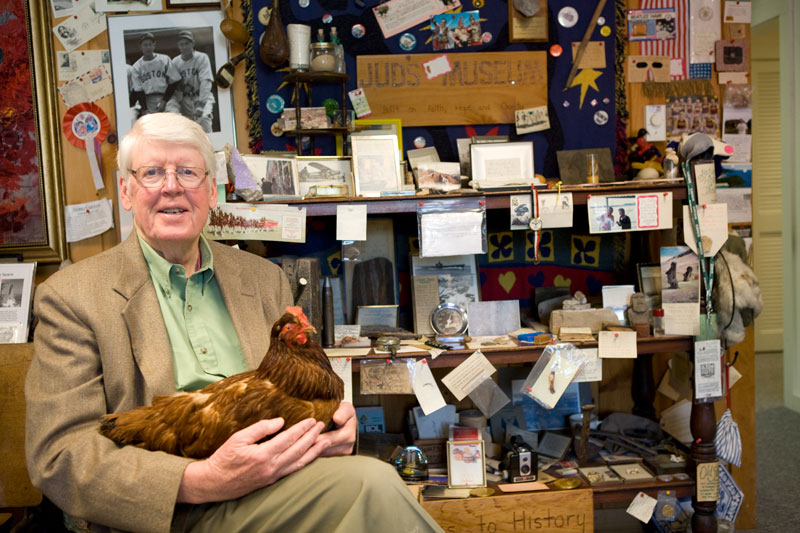Here in New England: My First Day
I wanted to be early for my first day on the job at Yankee Magazine, so I came in at 7:30 a.m. Robb Sagendorph, founder, publisher, and editor, had already been there for an hour. It was Monday, September 15, 1958, nine days after my wedding. “Look at this, Jud,” said my Uncle Robb, holding […]

I wanted to be early for my first day on the job at Yankee Magazine, so I came in at 7:30 a.m. Robb Sagendorph, founder, publisher, and editor, had already been there for an hour. It was Monday, September 15, 1958, nine days after my wedding.
“Look at this, Jud,” said my Uncle Robb, holding up a small brownish almanac as I came into the room, on the second floor of the red-clapboard building in the center of Dublin, New Hampshire. Uncle Robb’s small, battered, old desk was in one corner; mine, newer and bigger, in another; and three other people were scattered about the room as well. My presence that first morning instantly increased Yankee‘s editorial, advertising, and production staff by 20 percent.
“It’s an original 1793 edition of The Old Farmer’s Almanac,” said Uncle Robb, carefully leafing through the tattered pages for me to see. His hands, I noticed, were extraordinarily large, like the rest of him. He wore a bright-red bow tie and suspenders, the sleeves of his white Brooks Brothers shirt were rolled back to the midpoint of his long forearms, and a lighted cigarette was hanging from his mouth.
Most noticeable to me, however, were the deeply etched lines in his face. They were perfectly placed, as if by a sculptor. “Robb always looked like the Old Man of the Mountain,” recalled John MacDuffie, a Harvard classmate of both Uncle Robb’s and my father’s, at a memorial service following Uncle Robb’s death from cancer in 1970.
“He always made me think of Mount Sugarloaf here in South Deerfield,” Mrs. Eva Cane, one of the librarians at the Jones Library in Amherst, Massachusetts, wrote to Yankee after the same ceremony. “A great prow of New England surging forward with good-humored irony through the homely littleness of our days.” Did he, I often wondered, deliberately mold his character to conform to his craggy, mountain-like appearance?
“Very valuable,” said Uncle Robb, continuing to turn over the pages of the 1793 almanac. “Probably fewer than a dozen in existence, and I have three.” I noticed the ash on his cigarette was becoming long. As time went on during our subsequent 12 years together, I grew familiar enough with him to cry out, “Robb, your cigarette!” and he’d take it from his mouth and search for an ashtray, during which time the long ash usually fell off anyway. But on that first morning, I couldn’t do that.
“Life holds more meaning,” he went on, “when the past ties into the present,” and with that he picked up a copy of the new, just-printed 1958 edition of The Old Farmer’s Almanac lying on his desk. He held it up next to the old one. “When this happens, one gains the assurance that the present will tie into the future,” he said, suddenly looking directly up at me, with a smile made somewhat crooked by the continued presence of the cigarette.
The smile dislodged not only the long ash but the lighted head as well. I watched in some alarm as it fell directly onto the 1793 almanac and began smoking its way through the first few pages.
My expression alerted him to the crisis, and in the next instant we were both galvanized into action, blotting, slapping, and finally blowing away burnt pieces of the almanac from his desk.
“Perhaps not quite as valuable now, Robb,” I said laughingly, conscious that I had omitted the word “Uncle” for the first time. He laughed, too. My mother and others had warned me that he was stern, serious, imposing, and, as they always said, “difficult.” Yet in less than five minutes I felt close to this complex mountain of a man. It was the beginning of a bond between us that would outlive him by many years.
“Goddamnit!” he said, suddenly serious again, examining the almanac. Then he seemed to brighten. “Well, they say grief but aggravates the loss.” He was quoting from something echoing in his mind from years of prolific reading. “So grieve not for what is past,” he said, and with that he flipped the blackened almanac into an old wicker basket he had beside him on the floor.
“Come on,” he said, rising briskly, “let me show you what I’d like you to do this morning.” Though he was not quite 60 years old, his 6-foot-4-inch frame was somewhat bent at the waist as he walked across the room. I noted later, however, that there were times when he chose to walk ramrod straight.


